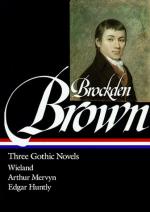|
This section contains 7,016 words (approx. 24 pages at 300 words per page) |

|
SOURCE: "Benevolence and the 'Utmost Stretch': Charles Brockden Brown's Narrative Dilemma," in Criticism, Vol. XIV, No. 2, Spring, 1972, pp. 175-91.
In the following essay, Witherington analyzes Brown's abandonment of fiction as a result of his failure to reconcile the two strains of his thought: the principles of objectivity and reason associated with the Enlightenment and the revolutionary and imaginative impulses of Romanticism.
The titles of Charles Brockden Brown's novels suggest the steps backward his fiction took from 1798 to 1801, and the failure of his plans for an American literature. The mythic sounding Sky-Walk is lost to us today, but an advertisement remains, claiming "strains of lofty eloquence, the exhibition of powerful motives, and a sort of audaciousness of character."1 Wieland and Ormond, the next novels, offer romance and exotic singularity. Arthur Meruyn and Edgar Huntly take up everyday names, which Clara Howard and Jane Talbot turn toward the woman's market...
|
This section contains 7,016 words (approx. 24 pages at 300 words per page) |

|


